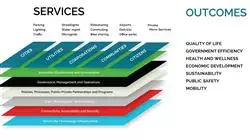University certificate
Accreditation/Membership
The world's largest faculty of engineering”
Introduction to the Program
Un programa exhaustivo y 100% online, exclusivo de TECH y con una perspectiva internacional respaldada por nuestra afiliación con American Society for Engineering Education”

Las Smart Cities hoy en día se encuentran a la vanguardia en los procesos de transformación digital y, según todos los indicadores tecnológicos, nos encontramos únicamente en el inicio de este camino, ya que, a medida que se exploran estas capacidades digitales, nuevos caminos y ámbitos de aplicación se van incorporando al ecosistema de las ciudades inteligentes.
Este Postgraduate certificate se enfocará a la parte principal de un proyecto global de Smart Cities: la plataforma. De esta manera, se indicarán las capacidades principales y la arquitectura general que una plataforma digital de ciudad debe proporcionar, así como el marco normativo y de recomendaciones de aplicación, tanto a nivel nacional como en el ámbito internacional.Una vez definido el marco general, se estudiarán los elementos habilitantes que, aun estando fuera de lo que se considera plataforma, son de vital importancia para conseguir la integración de todos los elementos que pueden componer una estructura de ciudad inteligente, haciendo especial hincapié en las redes de comunicaciones y en los sistemas de computación distribuida, tanto en cloud como en el edge.
También se conocerán las características que estas plataformas deben disponer en la capa de soporte, que es aquella que ofrecerá sus servicios a las demás (capas de negocio) para su correcto funcionamiento; entre estos servicios estarán los de seguridad, monitorización y gestión de usuarios. A su vez, un prestigioso Director Invitado Internacional impartirá una Masterclass de alta intensidad que otorgará a los ingenieros competencias avanzadas para optimizar su praxis diaria significativamente.
Gracias a que TECH es miembro de la American Society for Engineering Education (ASEE), sus estudiantes acceden gratuitamente a conferencias anuales y talleres regionales que enriquecen su formación en ingeniería. Además, disfrutan de acceso en línea a publicaciones especializadas como Prism y el Journal of Engineering Education, fortaleciendo su desarrollo académico y ampliando su red profesional en el ámbito internacional.
Un reconocido Director Invitado Internacional ofrecerá una rigurosa Masterclass que te permitirá procesar y analizar sistemas de almacenamiento de grandes volúmenes de datos”
Este Postgraduate certificate en Smart City Platforms: General Architecture and Acquisition Layer contiene el programa más completo y actualizado del mercado. Sus características más destacadas son:
- El desarrollo de casos prácticos presentados por expertos en Smart Cities
- Los contenidos gráficos, esquemáticos y eminentemente prácticos con los que están concebidos recogen una información científica y práctica sobre aquellas disciplinas indispensables para el ejercicio profesional
- Los ejercicios prácticos donde realizar el proceso de autoevaluación para mejorar el aprendizaje
- Su especial hincapié en metodologías innovadoras en plataformas Smart Cities
- Las lecciones teóricas, preguntas al experto, foros de discusión de temas controvertidos y trabajos de reflexión individual
- La disponibilidad de acceso a los contenidos desde cualquier dispositivo fijo o portátil con conexión a internet
Este Postgraduate certificate es la mejor inversión que puedes hacer en la selección de un programa de actualización en el ámbito de las Smart Cities. Te ofrecemos calidad y libre acceso a los contenidos”
Incluye, en su cuadro docente, a profesionales pertenecientes al ámbito de la ingeniería y la arquitectura, que vierten en esta capacitación la experiencia de su trabajo, además de reconocidos especialistas de sociedades de referencia y universidades de prestigio.
Su contenido multimedia, elaborado con la última tecnología educativa, permitirá al profesional un aprendizaje situado y contextual, es decir, un entorno simulado que proporcionará una capacitación inmersiva programada para entrenarse ante situaciones reales.
El diseño de este programa se centra en el Aprendizaje Basado en Problemas, mediante el cual el profesional deberá tratar de resolver las distintas situaciones de práctica profesional que se le planteen a lo largo del curso académico. Para ello, el profesional contará con la ayuda de un novedoso sistema de vídeo interactivo realizado por reconocidos expertos en plataformas Smart Cities y con gran experiencia.
Esta capacitación cuenta con el mejor material didáctico, lo que te permitirá un estudio contextual que te facilitará el aprendizaje"

Te ofrecemos un Postgraduate certificate 100% online que te permitirá compaginar tu tiempo de estudio con el resto de tus obligaciones diarias"
Why study at TECH?
TECH is the world’s largest online university. With an impressive catalog of more than 14,000 university programs available in 11 languages, it is positioned as a leader in employability, with a 99% job placement rate. In addition, it relies on an enormous faculty of more than 6,000 professors of the highest international renown.

Study at the world's largest online university and guarantee your professional success. The future starts at TECH”
The world’s best online university according to FORBES
The prestigious Forbes magazine, specialized in business and finance, has highlighted TECH as “the world's best online university” This is what they have recently stated in an article in their digital edition in which they echo the success story of this institution, “thanks to the academic offer it provides, the selection of its teaching staff, and an innovative learning method aimed at educating the professionals of the future”
A revolutionary study method, a cutting-edge faculty and a practical focus: the key to TECH's success.
The most complete study plans on the university scene
TECH offers the most complete study plans on the university scene, with syllabuses that cover fundamental concepts and, at the same time, the main scientific advances in their specific scientific areas. In addition, these programs are continuously being updated to guarantee students the academic vanguard and the most in-demand professional skills. In this way, the university's qualifications provide its graduates with a significant advantage to propel their careers to success.
TECH offers the most comprehensive and intensive study plans on the current university scene.
A world-class teaching staff
TECH's teaching staff is made up of more than 6,000 professors with the highest international recognition. Professors, researchers and top executives of multinational companies, including Isaiah Covington, performance coach of the Boston Celtics; Magda Romanska, principal investigator at Harvard MetaLAB; Ignacio Wistumba, chairman of the department of translational molecular pathology at MD Anderson Cancer Center; and D.W. Pine, creative director of TIME magazine, among others.
Internationally renowned experts, specialized in different branches of Health, Technology, Communication and Business, form part of the TECH faculty.
A unique learning method
TECH is the first university to use Relearning in all its programs. It is the best online learning methodology, accredited with international teaching quality certifications, provided by prestigious educational agencies. In addition, this disruptive educational model is complemented with the “Case Method”, thereby setting up a unique online teaching strategy. Innovative teaching resources are also implemented, including detailed videos, infographics and interactive summaries.
TECH combines Relearning and the Case Method in all its university programs to guarantee excellent theoretical and practical learning, studying whenever and wherever you want.
The world's largest online university
TECH is the world’s largest online university. We are the largest educational institution, with the best and widest online educational catalog, one hundred percent online and covering the vast majority of areas of knowledge. We offer a large selection of our own degrees and accredited online undergraduate and postgraduate degrees. In total, more than 14,000 university degrees, in eleven different languages, make us the largest educational largest in the world.
TECH has the world's most extensive catalog of academic and official programs, available in more than 11 languages.
Google Premier Partner
The American technology giant has awarded TECH the Google Google Premier Partner badge. This award, which is only available to 3% of the world's companies, highlights the efficient, flexible and tailored experience that this university provides to students. The recognition as a Google Premier Partner not only accredits the maximum rigor, performance and investment in TECH's digital infrastructures, but also places this university as one of the world's leading technology companies.
Google has positioned TECH in the top 3% of the world's most important technology companies by awarding it its Google Premier Partner badge.
The official online university of the NBA
TECH is the official online university of the NBA. Thanks to our agreement with the biggest league in basketball, we offer our students exclusive university programs, as well as a wide variety of educational resources focused on the business of the league and other areas of the sports industry. Each program is made up of a uniquely designed syllabus and features exceptional guest hosts: professionals with a distinguished sports background who will offer their expertise on the most relevant topics.
TECH has been selected by the NBA, the world's top basketball league, as its official online university.
The top-rated university by its students
Students have positioned TECH as the world's top-rated university on the main review websites, with a highest rating of 4.9 out of 5, obtained from more than 1,000 reviews. These results consolidate TECH as the benchmark university institution at an international level, reflecting the excellence and positive impact of its educational model.” reflecting the excellence and positive impact of its educational model.”
TECH is the world’s top-rated university by its students.
Leaders in employability
TECH has managed to become the leading university in employability. 99% of its students obtain jobs in the academic field they have studied, within one year of completing any of the university's programs. A similar number achieve immediate career enhancement. All this thanks to a study methodology that bases its effectiveness on the acquisition of practical skills, which are absolutely necessary for professional development.
99% of TECH graduates find a job within a year of completing their studies.
Postgraduate Certificate in Smart City Platforms: General Architecture and Procurement Layer
Immerse yourself in the fascinating world of smart cities with this Postgraduate Certificate in Smart City Platforms: General Architecture and Acquisition Layer from TECH Global University. Through our online classes, you will acquire the necessary knowledge to understand the architecture of smart cities and the data acquisition layer, key elements for the digital transformation of urban environments. Smart cities are the future of urban planning, and at our institution we are at the forefront of education in this field. Our program gives you the opportunity to explore the fundamental concepts of Smart City platforms, from their overall architecture to the data acquisition layer. You will learn how data is collected and processed in real time to optimize services and improve the quality of life of citizens. In our online classes we offer you the flexibility to study from anywhere and at any time. You will be able to access study materials through our user-friendly and intuitive online platform, participate in interactive discussions with experts in the field and enjoy a dynamic and enriching learning experience.
Let your education adapt to the pace of your life
With this Postgraduate Certificate in Smart City Platforms: General Architecture and Acquisition Layer, you will develop essential skills to design and manage smart city projects. You will learn about sensors and data collection devices, communication technologies, data analysis and practical applications in areas such as mobility, energy management, environment and much more. Don't miss the opportunity to be part of the smart city revolution! Enroll in the Postgraduate Certificate in Smart City Platforms: General Architecture and Acquisition Layer from TECH Global University and be a leader in the digital transformation of the cities of the future.







